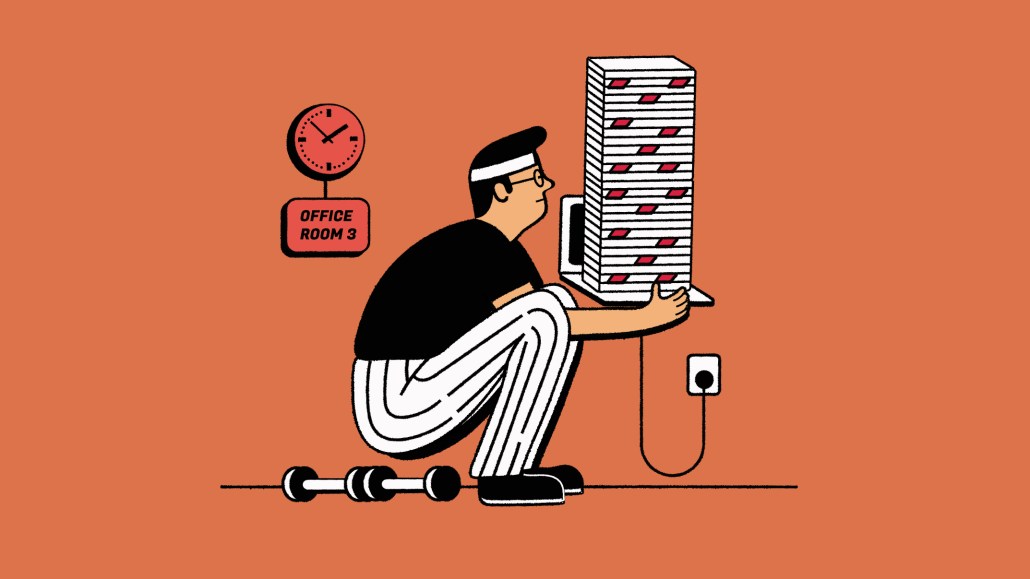Save 50% on a 3-month Digiday+ membership. Ends Dec 5.
With employee wellness top of mind, more companies push fitness programs as the hybrid return to the office begins

With the return to the office at hand, more companies are making the wellness of their people a priority — and that includes physical fitness.
Now, some employees have a high-profile workout buddy to help keep them on course. Wayfair, Samsung, SAP, Accenture Interactive and Sky are among the companies joining Peloton’s new Corporate Wellness program, which provides employees access to the Peloton app and exclusive benefits on its connected fitness products to support team building and healthy habits.
“We heard from partners that they need flexible employee wellness solutions that can meet the evolving demands of a modern workforce,” said Cassidy Rouse, global general manager of Peloton Corporate Wellness. “Whether you’re at home, on the road, or in the office, you should be able to access the physical or mental exercise that fits your schedule, and even team up with a coworker to motivate each other.”
Some companies have gone as far as to create dedicated studios equipped with the sleek bikes and technology the brand is known for, but perhaps the timeliest feature of the new program is its portability, considering employers’ embrace of hybrid work arrangements. “We spent a lot of time asking, What does the future of work look like?” said Rouse. “Everyone agrees that it’s more flexible and more dynamic. Organizations need wellness benefits that meet the needs of employees where they are.”
The benefits are not limited to physical fitness. In a survey of members in the U.S., U.K., Canada, and Germany, 83% of Peloton members said their Peloton routine made them feel more accomplished at work while 64% said it made them more productive.
Firms that partner with Peloton, which boasts 5.4 million members globally, can offer their employees subsidized access to Peloton memberships and connected fitness products. Peloton is promoting the program not only as a means to boost employee health and wellness, but also as a tool for employers to encourage employee engagement and workforce retention.
Dan Healey, head of HR for SAP North America, said the last year showed that strategic investments in programs that foster strong employee engagement, teamwork and inspiration can drive positive results that support hybrid working models. “Our decision to build on early momentum seen from Peloton exercise campaigns we held last year and join Peloton’s Corporate Wellness program reflects this experience,” he added.
Ad position: web_incontent_pos1
Peloton has also partnered with healthcare and insurance company UnitedHealthcare to provide members of the health plan with access to thousands of live and on-demand classes via the Peloton app. These will be available starting in September and will be available for up to a year, or members can receive a four-month waiver toward an all-access membership at no additional charge.
Fitbit is another fitness brand looking to build connections with companies and their people. Its enterprise health platform, Fitbit Care, was designed to motivate employees to manage their health and fitness via the personal trackers the company is famous for, as well as in-person coaching support.
Emory University, a corporate partner of Fitbit, reported that 92% of its employees said the service motivated them to be more active, while Robert S. Montgomery-Rice, president and CEO of Bangor Savings Bank, another corporate client, said: “Anything we can do to help employees stay healthy is a win for everyone. It means they are more productive employees — more engaged with their teammates and our clients.”
Of course, company gyms have been a mainstay of big tech firms like Google and Apple forever, while elsewhere, subsidized health club memberships have become a familiar employee benefit. But the reconfiguration of office spaces amid The Great Reopening has inspired more companies (and not just the Googles of the world) to build fitness facilities right in their own headquarters, including workout rooms, yoga studios and walking tracks.
Robin Skidmore, CEO of U.K.-based performance marketing agency Journey Further, said that since COVID-19 the company has made “significant investments” at all three of its offices based on employee input, including real estate devoted to fitness. “Our offices are an integral part of our culture, so it was an important signal to the business that we needed to continue to invest in it, preparing for when we could return,” added Skidmore, whose shop has done work for clients like Clos19 and Airtasker. The company now sports space for deep work, HIIT, yoga classes and weight training.
Ad position: web_incontent_pos2
Grace Roberts, global communications officer at the creative agency B-Reel, said that in planning for employees’ return to the office, it was essential to create a space where they could focus on their physical and mental wellbeing. Its new fitness facility includes yoga mats, Chirp wheels and access to the breathing app State, which was developed by the agency.
It’s just the latest fitness initiative at B-Reel, which counts Nike and H&M among its accounts. “Wellness Wednesdays” are already an established weekly feature of the company, which also offers employees a monthly stipend toward health and wellness activities that serve to help them recharge and refocus.
More in Media

What publishers are wishing for this holiday season: End AI scraping and determine AI-powered audience value
Publishers want a fair, structured, regulated AI environment and they also want to define what the next decade of audience metrics looks like.

Digiday+ Research Subscription Index 2025: Subscription strategies from Bloomberg, The New York Times, Vox and others
Digiday’s third annual Subscription Index examines and measures publishers’ subscription strategies to identify common approaches and key tactics among Bloomberg, The New York Times, Vox and others.

From lawsuits to lobbying: How publishers are fighting AI
We may be closing out 2025, but publishers aren’t retreating from the battle of AI search — some are escalating it, and they expect the fight to stretch deep into 2026.
Ad position: web_bfu



